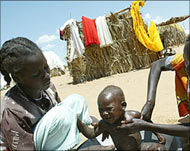Darfur rebels’ demand stalls aid deal
Sudanese rebels have insisted that the Khartoum government disarm its militias in Darfur before they sign a deal to bring aid to 1.5 million civilians displaced by violence.

The rebels’ reluctance to sign the “humanitarian protocol” on the second day of peace talks in the Nigerian capital Abuja on Tuesday brought the two sides back to the sticking point that caused a round of talks in September to end deadlocked.
“We’ve told the rebels that for them to be seen as blocking the signature of the humanitarian protocol is not very good,” a European Union diplomat attending the talks said.
If signed, the aid deal would be the first meaningful agreement in three rounds of talks that began in July.
On paper it would give aid workers unrestricted access to the area, which is the size of France, commit both sides to preventing attacks on civilians and allow for refugees to return home.
Continued crisis
 |
|
A UN report says nearly half the |
The United Nations says humanitarian workers have had better access to desert refugee camps dotted along the border of Sudan and Chad over the last few months, but the refugees still face a food crisis worse than famines there in the 1980s and 1990s.
Nearly half the population of Darfur is short of food and one young child in five is malnourished, the UN World Food Programme said on Tuesday.
Rebels say the humanitarian protocol would be pointless without a deal on security, including disarming the Janjawid, a militia that has driven farmers from their homes in a campaign of rape, looting and burning.
Rebels cautioned
“Humanitarian and security issues are interlinked. We can sign the two protocols together,” Ahmad Hussain Adam, a spokesman for the JEM rebel group, one of two at the talks, said.
|
“The rebels should not take the international community for granted” Unidentified European diplomat |
Analysts at the talks said the rebels had stalled on the humanitarian deal believing deteriorating conditions in refugee camps in the vast region would pile pressure on the government to concede ground on issues such as disarmament.
“The rebels should not take the international community for granted. They think they have all the international sympathies, but if they are seen as the ones who are stalling, they will have to pay a price,” the European diplomat said.
Rebels adjourned meetings on security and political issues on Monday and Tuesday almost as soon as they started, saying they needed more time to fix a position.
Analysts said the continual requests for adjournments exposed serious internal splits in rebel ranks.
Shutdown threat
 |
|
Ismail threatened to shut down |
In another development, Sudan on Tuesday warned that it would shut down the US embassy in Khartoum by the end of October if Washington did not offer to assist Sudan‘s embassy in Washington in reopening a current account at US banks to finance its operations.
The US administration had failed in the last three months to help the Sudanese embassy in Washington open a current account, Sudan‘s Foreign Minister Mustafa Ismail said.
Sudan would treat the US embassy in Khartoum on similar terms in case its embassy in Washington failed to resume its work, Ismail added.
Ismail also denied that his government had rejected Washington‘s request to permit US aircraft to land in Darfur for transporting African troops designated to supervise a ceasefire in the region.